Spotify RADAR presents Joy Crookes for #Notion90

- Words Kaeshelle Rianne
- Photography and Creative Direction Jessica Ross
- Fashion Natalie Roar
- Makeup Mata Marielle at CLM Agency
- Hair Shamara Roper
- Photography Assistants Rashidi Noah & Adam Aouti
- Styling Assistants Emmanouela Megkistou & Tolu Enitan
- Set Designer Anthony Hensman
- Retouching Charlie Shrives
- Production Studio Notion
- Location Big Sky Studios
Confronting and comforting at the same time, Joy Crookes’ debut album Skin is a stirring testimony to the story of her life so far.
Harnessing the power in her voice, singer-songwriter and instrumentalist Joy Crookes is unyielding in the delivery of her highly-anticipated debut album. Released on October 15th, Skin reads like an autobiography, bursting at the seams with eclectic singles from an artist who dares to own her identity.
Brit-nominated or not, many people wouldn’t be able to pair penny loafers with trackies. As quirky as that might sound, Joy Crookes makes it fashion. And the fans packing out the South Londoner’s secret shows are allured by just that — her dauntlessness.
As a co-executive producer, Joy is credited with Blue May for her hands-on approach to bringing the masterpiece to life. When snippets weren’t being recorded in Stockwell tower blocks or in random East London hotel rooms, the artist made a home of Konk Studios — one of the City’s oldest independent studios, founded by The Kinks. Comprising an 18-piece string section recorded at Abbey Road Studios and the old school method — taping vocals from “top to bottom” — Joy Crookes’ debut album is soaked in the richness of British musical history.
Sitting down with Joy, we delve deeper into some of the experiences that have shaped her masterful body of work.
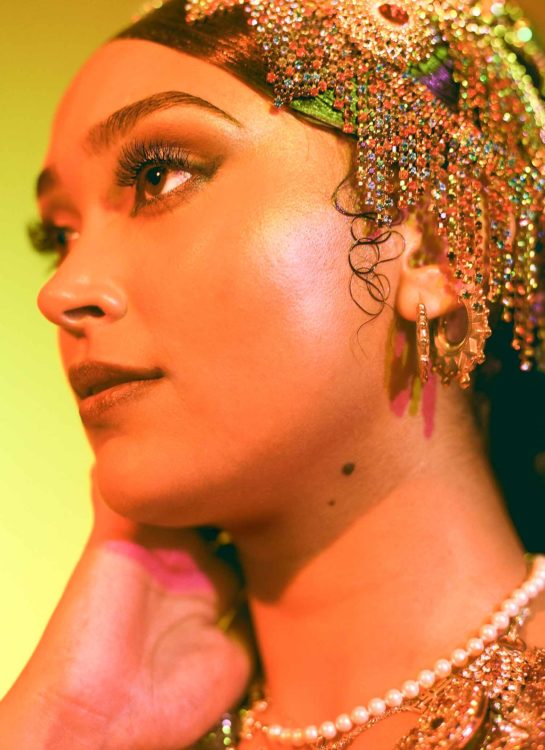
- Necklace Pebble London
- Headpiece Roar Studios
- Ring's Joy's Own
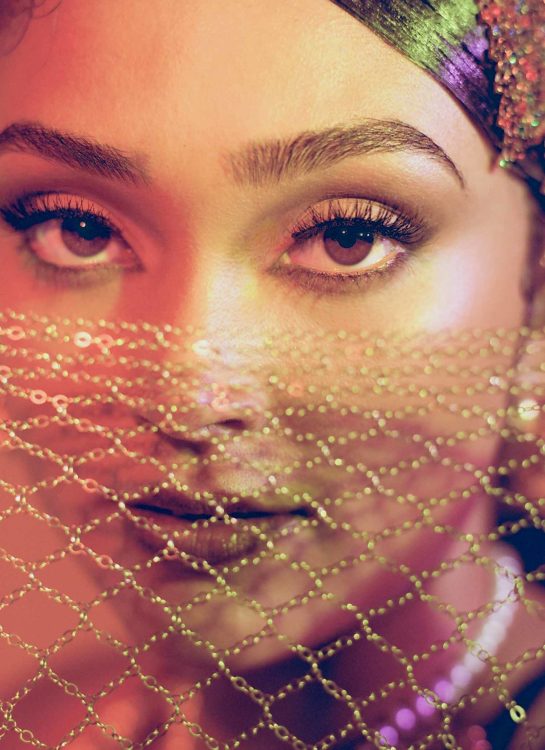
Beaming upon the mention of her grandma, Joy says: “When she sought political asylum, they offered her Wembley or South London. She didn’t like the idea of Wembley because it felt like they were segregating her and making her live amongst just her community, and she wanted to be around more of a mix.” This decision might have seemed small at the time, but it laid the foundations for Joy’s South of the River upbringing and the genre blend heard in her music, as well as, perhaps, her political conviction.
On standout track “19th Floor”, we hear Joy’s last whispers of “I love you nanny” as she leaves the flat. “It was getting towards the end of the album, and the deadline was near, so I decided to record things that seem menial to me but always happen… While I’m getting into the lift, my grandma always goes ‘I love you’ over again until the door closes,” she explains. After getting stuck in the lift as a child, the snippet is more than context; it’s also loaded with memories and emotion, part of Joy’s journey.
Equally striking and personal is the video for “Feet Don’t Fail Me Now”, which commands our attention with its stunning floral arrangements draped over wheelying motorcycles. And this display was still not nearly as impressive as hair stylist Issac Poleon’s breathtaking coiffures.
“I don’t know how Isaac did that because it was so far away from my head. Every one of us had over two-metre-long braids, and he found a way to weave the hair together with the other person,” says Joy. The thread of braids linking her with the video’s jewellery-adorned cast didn’t come without complications. Tugging a little too hard could have ended in a real disaster — “Since we were all braided together, the people with the braids had to walk everywhere together. When you needed a wee, it was peak,” she says with a chuckle.
“When I’m in the air in the video I’m in a harness, and no one told the harnessing company that I was a woman. They brought a men’s suit and it just wasn’t right for my body. I had bruises all over my hips, my legs, my ribs,” she continues.
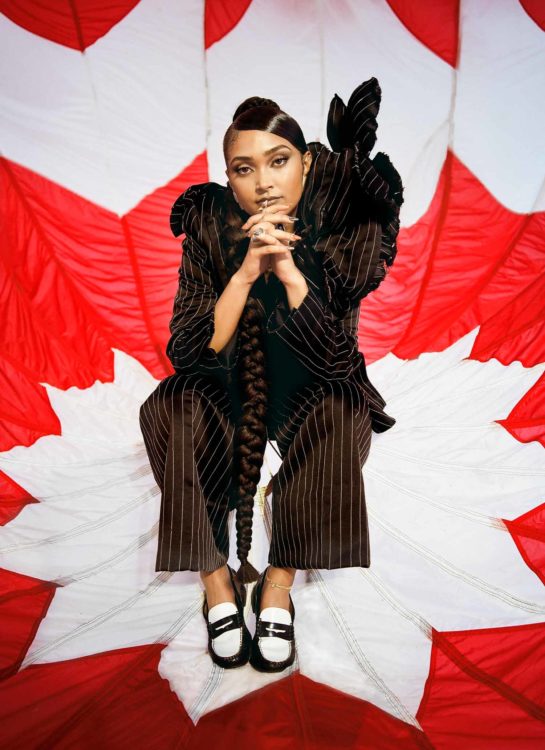
- Suit Christine Ha
- Shoes Sebago
- Earrings Khula
- Rings Pebble London, Yaa Yaa London, Walton Jemma, Joy's Own
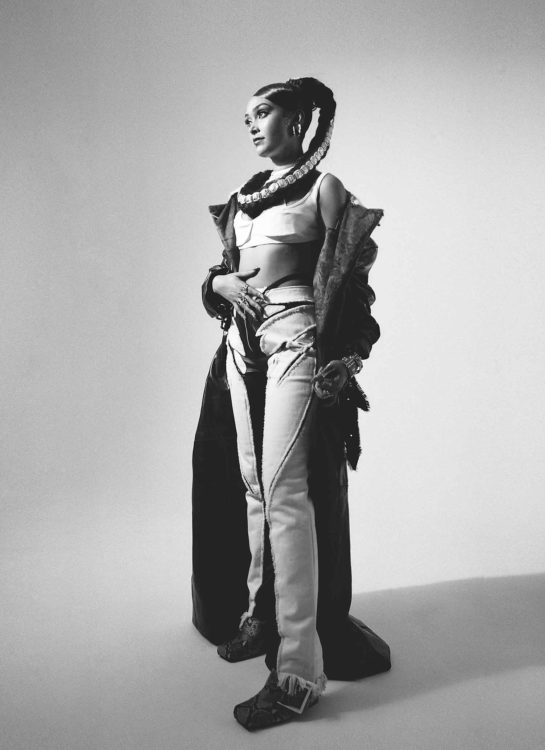
- Coat Guido Mösch
- Top & Trousers Dimitris Karagiannakis
- Shoes Roker
- Earrings Joy's Own
- Bracelets Pebble London
- Rings Joy's Own
Despite the gravity-defying stunts, it’s Joy’s words that make the broken promises of radical change known. We’re living in an era of uninterrupted content consumption, and the claims of “retweeting picket signs” and “keeping up appearances” are lines that hold both the listener and artist accountable.
“As much as I’m playing an ironic character, we’ve all been that ironic character. We’ve all been complicit. I literally have a line in “Feet Don’t Fail Me Now” that says: ‘The dopamine tuition will keep me wrong from right’,” Joy points out. As we all well know, it’s not as easy as flicking a switch.
“I am very much an artist, but as a businesswoman, I’ve also got tours and secret shows. There’s so much work that goes behind everything. Fundamentally, social media is just part of the job,” she says, acknowledging the demands of being a public-facing artist in 2021. “I am addicted, and I think the majority of the people in our generation are. It’s very hard to separate because it’s so interconnected with my work.”
In the music business the internet is indispensable; it’s a site for discovery, and from uploading cover videos on YouTube to her new RADAR partnership with Spotify, Joy’s career is leaping bounds. “These days, I think for every artist’s career — whether you like it or not — Spotify is necessary. Everything’s moved from physical CDs, vinyl and cassettes to streaming. And Spotify has a way of using playlists, so if you like this artist you might like another. They’re tastemakers and they’re like the missionaries of music,” she says. “I’m just excited to get my music across to more people across the world and be able to play shows in places that I would have never thought I’d have a fan base.”
It’s also through online spaces that we grapple with questions of identity. “I like watching how this generation discusses gender, sexuality and how we present ourselves, being femme, being masc or fluid,” says Joy. The warmth, the earthy tones and her not quite nude torso in the artwork reflect this sense of liberation. It’s only natural that Carlota Guerrero, who photographed Solange’s ethereal A Seat at the Table cover, found a way to shoot feminism into Skin too.
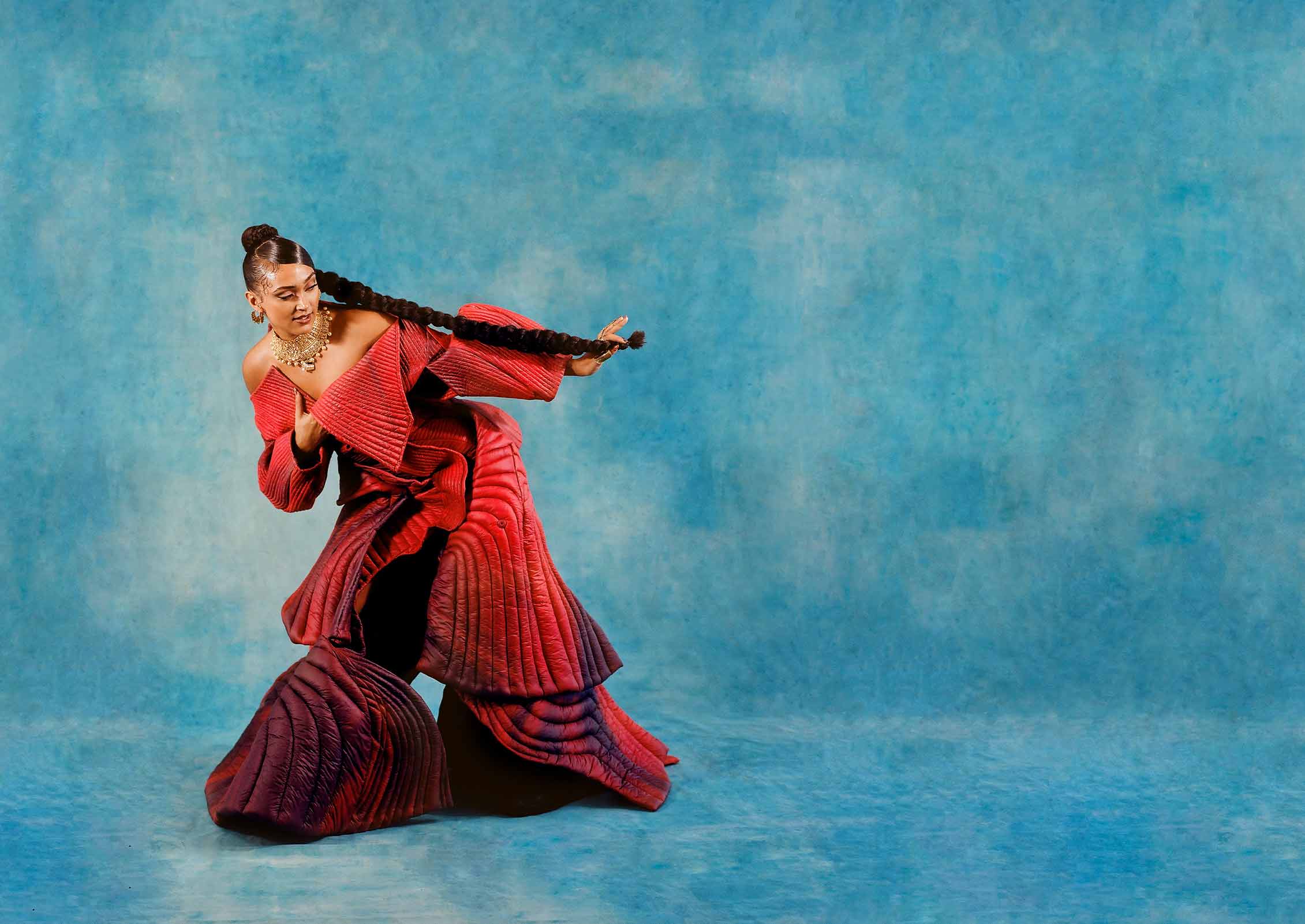
- Dress Christine Ha
- Necklace Pebble London
- Shoes Grenson
- Rings Joy's Own
- Earrings Joy's Own
Joy is often dripping with golden hoops, bangles and rings in her videos; sometimes she wears sarees and even rhinestone-embellished bralettes, but the artist has had her own internal struggles with femininity. Unearthing the roots of such inner conflict, “Unlearn You” addresses the effects of childhood trauma. Joy didn’t know what upskirting was as a child, but it frightened her, she explains: “I was afraid that someone was going to harm me.”
In the song’s second verse, she sings: “I didn’t ever wear a dress / In case you thought I was asking for it”. In all her childhood photos, she’s always “dressed as a boy” because that’s how she felt comfortable. She practically outright refused to wear anything but trackies, jeans and trousers until an indie musician with a bold personality came into her world. “Discovering Kate Nash, and then now being able to call her my friend, is one of the most full circle experiences in my career. It’s one of the things that I feel so grounded by,” Joy says.
“I literally had dinner with her the other night and we were just discussing it. We almost always break into tears when we talk about it, because when you’re an artist you’re so absorbed in your own shit, your own stress and pressures you don’t realise that you can actually change people’s lives. Kate Nash changed my life by just existing […] People talk about representation and ‘Oh, you didn’t see any other brown girls on TV’, but representation to me goes beyond how people look. It’s how they express themselves, and for me, watching her express herself felt so powerful and loud,” explains Joy, who even tried to get the same haircut — late noughties side-swept fringe included. “Now I feel like I can tap into my feminine side, and even go as far as to dress sexy and not feel like that makes me any less strong, but more powerful.”
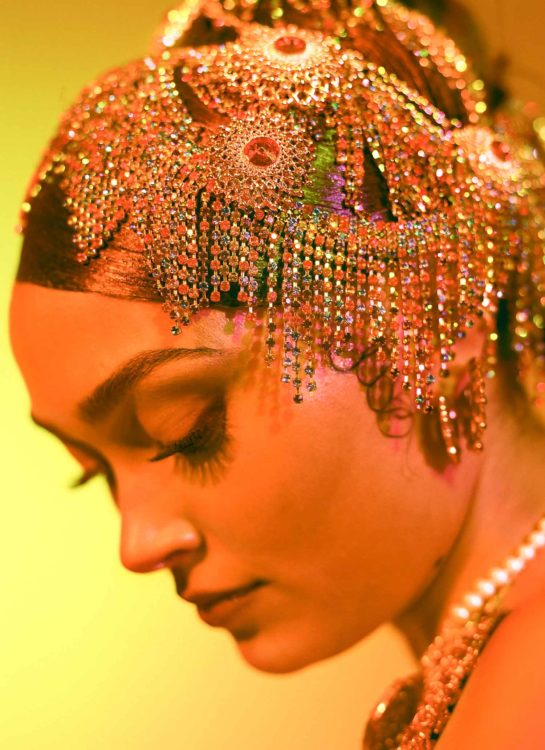
- Necklace Pebble London
- Headpiece Roar Studios
- Rings Joy's Own
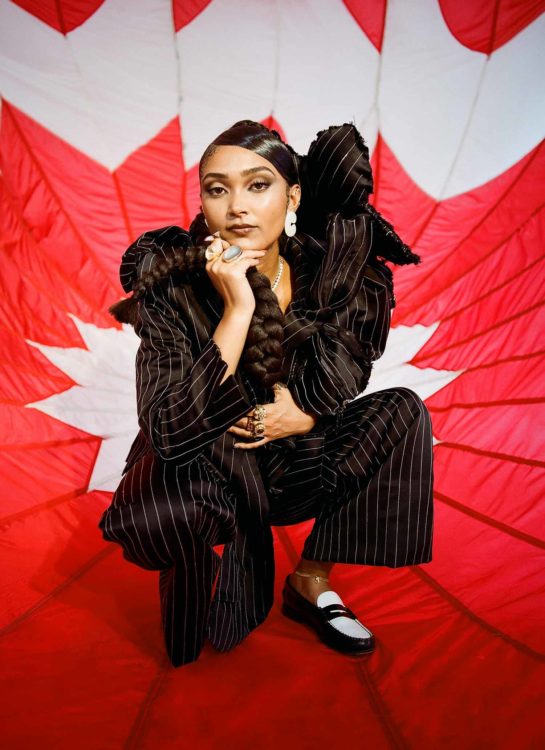
- Suit Christine Ha
- Shoes Sebago
- Earrings Khula
- Rings Pebble London, Yaa Yaa London, Walton Emma, Joy's Own
- Necklaces Joy's Own
Online, as offline, there will always be highs and lows, but ultimately: “It tears me more away from being a human,” she muses. “Almost into a machine.” And yet, the sensation that comes with listening to the title track “Skin” is unmistakably human.
“I feel like my best performances happen when I’m not thinking so much — I’m feeling,” Joy says of that sensation. “There’s a massive distinction because sometimes we force ourselves to think: ‘OK, I’m about to sing a song about suicide, so I need to really go into that’. Actually, when you just feel, it’s a little bit like… I recently watched Respect in the cinema and my favourite scene was when Jennifer Hudson [playing Aretha Franklin] was singing in church. They talk about the spirit. When the spirit moves, you aren’t thinking. You’re just feeling.”
When Joy sings: “What if you decide that you don’t wanna wake up, too? / I don’t know what I’d do”, you can almost hear time itself holding its breath; hair-raising to the point it’s spine-chilling and raw — imperfectly perfect. “‘Skin’ has no comping, it’s just one take. And that’s just take four, we knew that was the take […] The spirit was moving at that point,” she tells me. “And in some places I’m a little bit flat. We didn’t fix that either. We kept all of that in.”
Head to toe — from “I Don’t Mind” to “Theek Ache” — the songwriting throughout Skin is grounded in the soul of the city that doesn’t stop for no one. And it’s no mistake that the Bengali-titled track “Theek Ache” brings the album to a close, wrapping the sometimes tear-inducing tracks snugly in a warm embrace.
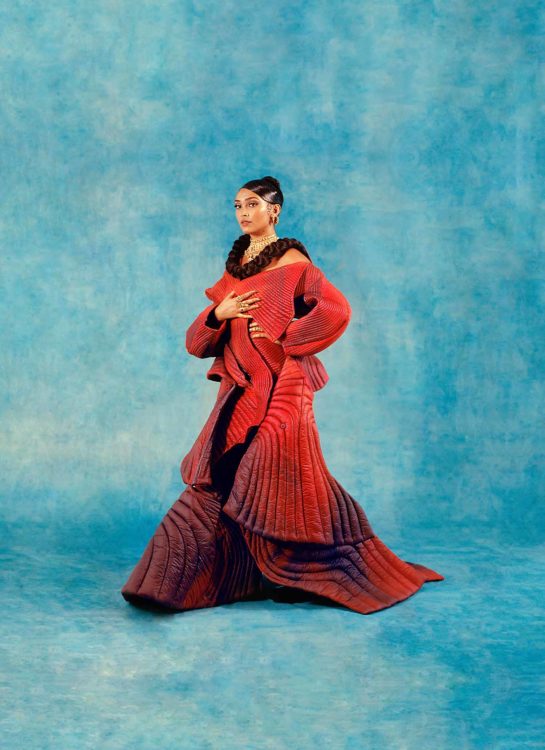
- Dress Christine Ha
- Necklace Pebble London
- Shoes Grenson
- Rings Joy's Own
- Earrings Joy's Own
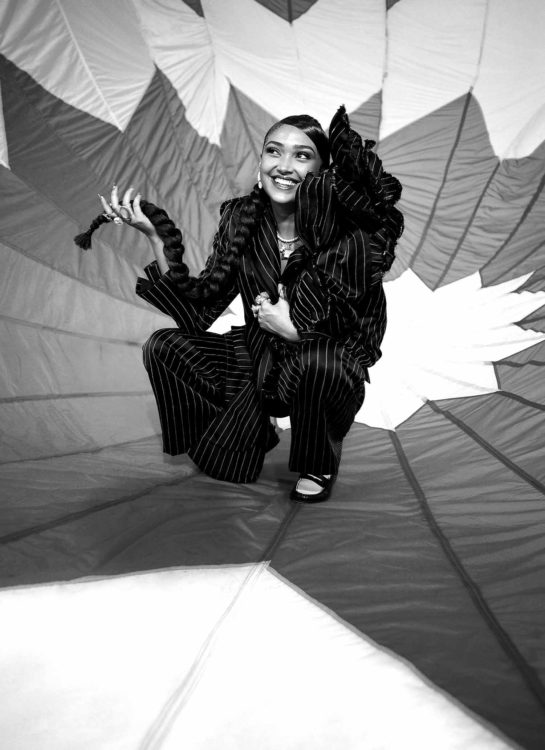
- Suit Christine Ha
- Shoes Sebago
- Earrings Khula
- Rings Pebble London, Yaa Yaa London, Walton Emma, Joy's Own
- Necklaces Joy's Own

